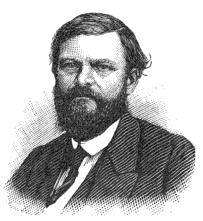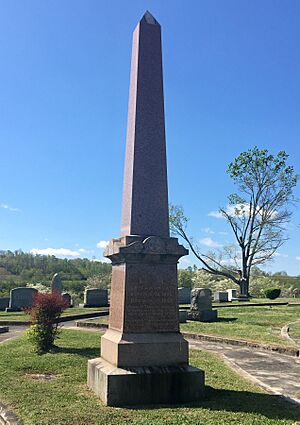Dewitt Clinton Senter facts for kids
Quick facts for kids
Dewitt Clinton Senter
|
|
|---|---|
 |
|
| 18th Governor of Tennessee | |
| In office February 25, 1869 – October 10, 1871 |
|
| Preceded by | William G. Brownlow |
| Succeeded by | John C. Brown |
| Speaker of the Tennessee Senate | |
| In office 1867–1869 |
|
| Preceded by | Joshua B. Frierson |
| Succeeded by | Philip P.C. Nelson |
| Member of the Tennessee House of Representatives | |
| In office 1855–1861 |
|
| Member of the Tennessee Senate | |
| In office 1865–1869 |
|
| Personal details | |
| Born | March 26, 1830 McMinn County, Tennessee |
| Died | June 14, 1898 (aged 68) Morristown, Tennessee |
| Resting place | Emma Jarnagin Cemetery, Morristown, Tennessee |
| Political party | Whig, Republican |
| Spouse | Harriet T. Senter (1859) |
| Profession | Farmer |
Dewitt Clinton Senter (March 26, 1830 – June 14, 1898) was an important American politician from Tennessee. He served as the 18th Governor of Tennessee from 1869 to 1871.
Before becoming governor, Senter was a member of the Tennessee House of Representatives from 1855 to 1861. During this time, he strongly disagreed with the idea of states leaving the United States, especially as the American Civil War was about to begin. After the war, he was elected to the Tennessee Senate. In 1867, he became the Speaker of the Senate.
Senter became governor when the previous governor, William G. Brownlow, resigned in 1869. Senter is well-known for changing many of Brownlow's strict rules. One of his biggest actions was giving back the right to vote to people who had supported the Confederates during the Civil War. The current Tennessee State Constitution was also written and approved while Senter was governor.
Contents
Early Life and Political Start
Dewitt Senter was born in McMinn County, Tennessee, on March 26, 1830. His father, William Tandy Senter, was a well-known minister and speaker. His father also served in the United States House of Representatives and helped write Tennessee's constitution in 1834.
Dewitt grew up in what is now Hamblen County, Tennessee. He went to public schools there. Later, he studied at Strawberry Plains College from 1851 to 1852. He also spent about a year studying law.
Serving in the State Legislature
From 1855 to 1861, Senter represented Grainger County in the Tennessee House of Representatives. He was a member of the Whig Party. He was very much against states leaving the Union before the Civil War.
In May 1861, he voted against Tennessee's decision to leave the United States. He traveled around East Tennessee, trying to get people to support the Union. He was also part of a meeting in East Tennessee that wanted to form a separate state that would stay with the Union.
Civil War and After
In 1862, Confederate leaders arrested Senter and put him in jail for several months. After he was released, he went to Louisville, Kentucky, for safety. In the 1864 presidential election, he was a supporter of the Republican Party.
In January 1865, Senter was elected to the Tennessee Senate. He represented several counties, including Grainger and Claiborne. In the Senate, he led the Committee on Incorporations. He also became the president of a railroad company, the Cincinnati, Cumberland Gap and Charleston Railroad, serving until 1866. In 1867, the state Senate chose him to be their Speaker.
Becoming Governor of Tennessee
Dewitt Senter first supported the strong policies of Governor William G. Brownlow. These policies included taking away the right to vote from former Confederates. In October 1867, Senter helped Brownlow get elected to the United States Senate.
Governor Brownlow resigned on February 25, 1869, to go to Washington, D.C., and take his Senate seat. According to Tennessee's constitution, the Speaker of the Senate becomes governor if the governor resigns. So, Senter became governor after Brownlow stepped down.
Changing State Policies
Brownlow's strict rules had caused a lot of division in Tennessee. They also led to the rise of groups like the Ku Klux Klan. When Senter became governor, he promised to stop the Klan's violence.
However, in May 1869, he decided to get rid of the state guard. This group had been fighting the Klan but had become very unpopular. Senter also announced that he supported giving voting rights back to former Confederates.
The Election of 1869
Since Brownlow resigned near the end of his term, Senter had to run for election very quickly. His decision to be more forgiving toward former Confederates caused a split among the state's Republicans. Many Republicans wanted to continue Brownlow's strict policies. They worried about what would happen if former Confederates and Democrats got control of the state again.
At a big meeting of Republicans on May 20, 1869, they couldn't agree on a candidate for governor. So, they held two separate meetings. One group, who wanted stricter rules, nominated William B. Stokes. The other group, who wanted more lenient policies, nominated Senter.
Under Governor Brownlow, the state legislature had given the governor the power to choose county election officials. These officials were supposed to make sure former Confederates didn't vote. Senter used this power to replace almost three-fourths of Brownlow's officials. Even though the law still technically stopped former Confederates from voting, Senter's new officials did not enforce it. Because many former Confederates could now vote, Senter easily won the election. He received 120,333 votes, while Stokes received 55,036.
New State Constitution
To fix problems with voting rights, a new state constitutional meeting was held in 1870. This meeting changed the state constitution to allow all men aged 21 or older to vote, no matter their race. However, it also added a poll tax, which meant people had to pay to vote. It also ordered separate schools for white and black children. The new constitution was approved by a vote of 98,128 to 33,972.
Other Actions as Governor
Besides voting issues, Senter was also worried about Tennessee's growing debt. In December 1869, he asked for changes to the state's prisons, saying they were costing the state too much money.
To encourage more people to move to Tennessee and increase tax money, Senter created the Tennessee Immigration and Labor Association in February 1871. He also wanted to help railroad companies that were having trouble paying back money they owed to the state.
In 1870, Senter used his influence to help create Hamblen County. This new county was made from parts of other counties. Senter's own home was located within this new county.
Later Life and Legacy
Senter's policies allowed Democrats to gain control of Tennessee again. This made many Republicans in the state angry and effectively ended his political career.
He spent the rest of his life managing his large farm near Morristown. Dewitt Clinton Senter passed away on June 14, 1898. He is buried in Morristown's Emma Jarnagin Cemetery.
Family
Dewitt Senter married Harriet Senter, who was a distant cousin, in 1859. Her father was P.M. Senter, a court clerk from Grainger County. Dewitt and Harriet Senter did not have any children.
 | Selma Burke |
 | Pauline Powell Burns |
 | Frederick J. Brown |
 | Robert Blackburn |


